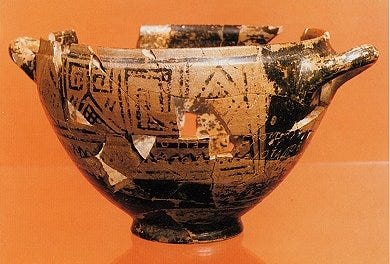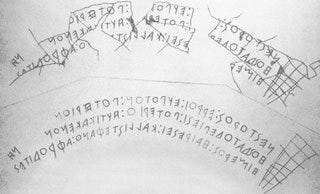Nestor’s avaunted cup can go to Hell, I say! Whoever drinks from this cup, he will straight away succumb to fair-crowned Aphrodite’s tender sway!
Some time in the mid 8th century BC, party revellers in the Greek settlement on the island of Ischia, in the Bay of Naples off the south western coast of Italy, were playing a traditional game that worked like today’s game of poetic ‘Consequences’: I say a line, someone else picks it up and rhymes it, then another and so on until a poem is made.
Speaking in Greek iambic metre (which I replicate here in English rhythm), one partygoer lifted an earthenware beaker full of wine and declaimed
“Nestor’s avaunted cup can go to Hell, I say”.
He was making a witty allusion was to the legendary cup that the aged hero Nestor in Homer’s Iliad (Book 11) is said to have used, here called eupoton, literally ‘good for drinking from’. The unusual adjective parodies a Homeric-style epithet.
Unlike the modest vessel at hand, Nestor’s cup was made for a true hero, and described as “beautifully wrought and studded with bosses of gold; it had four handles, on each of which two golden doves were feeding, and it had two feet as stands. Anyone else would hardly have been able to lift it from the table when it was full, but Nestor could do so easily.” Perhaps it was imagined more like the golden goblet dated to around 1600 BC excavated at the site of ancient Mycenae.
The speaker passed the cup to a friend at the party (symposion in Greek, which means “companionable drinking”), who held out the cup and capped his friend’s line with another in hexameters, Homer’s own metre (which doesn’t work well in English, so I translate with the same iambic metre as the first line, plus rhyme):
Whoever drinks from this cup, he will straight away...
This sounds like the start of an ancient Greek threat formula! Don’t drink from my pint - or else…
But the second speaker then passed it to a third, who wittily changed the tone from threat to love, composing a further hexameter:
…Succumb to fair-crowned Aphrodite’s tender sway!
The suggestion is that the wine in this cup encourages drinkers to indulge in amatory pursuits (Aphrodite was the goddess of Love) - something less suited to the elderly Nestor with his ‘avaunted’ goblet, good only for drinking. Perhaps the speaker even heard the epithet eupoton, ‘good for drink’, as suggesting a punning alternative eu-pothon ‘good for desire’.
The drinkers recorded the result of the game by scratching the verses on the cup that had focussed their wit. It was dug up in 1954 in a damaged state, and the verses were recognised as the earliest inscribed object with Greek hexameters.
When restored, a gap in the text remained in the first line between the letters E and I. Most scholars reconstruct the word there as EIMI, “I am”. But I prefer the restoration EPPOI (erroi, ‘to Hell with”), as shown on this sketch of the inscription (to be read from right to left) with the restored version below:
Νέστορος [ἐρροὶ] εὔποτ[ον] ποτήριο[ν]·
ὃς δ’ ἂν τοῦδε π[ίησι] ποτηρί[ου] αὐτίκα κῆνον
ἵμερ[ος αἱρ]ήσει καλλιστ[εφάν]ου Ἀφροδίτης.






